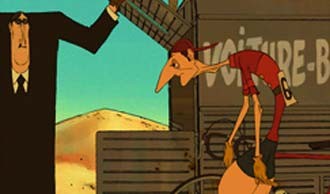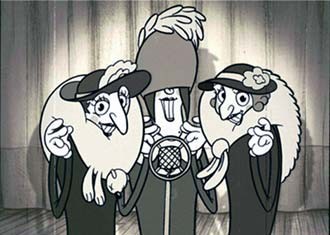| Champion, in training for the Tour de France |
The folks over at the Academy of Motion Picture Arts and Sciences may have stumbled when they started giving awards to animated features two years ago - refusing to nominate Waking Life, the very sort of daring, unique project for which awards are invented - but they regained some credibility last year, when the dazzling import Spirited Away was honored over a quartet of much better-known studio films.
So it's not completely inconceivable that, despite the enormous success of Finding Nemo (a delightful film, but not Pixar's best), this year's golden bald man will go to an obscure, nearly wordless French/Canadian film that, for sheer imaginative power and quirky charm, deserves it more.
Beginning with a giddy musical tribute to pioneering cartoonist Max Fleischer, in which real-life entertainers like Django Reinhardt and Josephine Baker are parodied, Triplets quickly moves to the outskirts of Paris, where a sad, rotund boy (ironically named Champion) lives with his grandmother. One line of dialogue is spoken, and those are practically the last words we will hear.
| The Triplets of Belleville Dir. & writ. Sylvain Chomet; feat. Michèle Caucheteux, Jean-Claude Donda, Michel Robin, Monica Viegas (PG-13) Current Choice | ζ |
The plot begins when Champion is kidnapped during the race, stolen for unknown purposes, and Grandma sets off with Bruno on the long quest to rescue him. They follow his trail to Belleville, a fictional hybrid of Montreal and New York City, and are taken in by the Triplets, a singing group featured earlier in the film.
Readers may find more than a little similarity between this plot and the one driving Finding Nemo. But the films could hardly be less alike in what they do with that simple lost-child scenario. In place of the comic dialogue Nemo offers, Triplets employs the sight gags and slow-building physical humor of classic silent films. We're astonished by the inventive methods Grandma has for loosening Champion's muscles after a hard day of cycling, we cheer her mercilessly perfect fix for a flat tire, we root for her daring scheme to beat the kidnappers. For such an unassuming character, Grandma is remarkably potent; unlike Nemo's insecure, worried dad, she has a single-minded, self-assured devotion that is completely endearing.
| The finger-snapping Triplets of Belleville |
In contrast to the undersea wonderland of Nemo, where nothing would exist without computer animation, Triplets makes its technological tools almost invisible, using 3-D rendering to achieve certain effects (the fluid motion of automobiles, the rough seas between Paris and Belleville) but always making it subservient to the style of writer/director Sylvain Chomet, whose ridiculously exaggerated characters and rustic drawing line have more in common with European comic books than with most feature films.
Like Spirited Away, Triplets contains some material that American parents may find challengingly dark for young children (additionally, we get a good look at the cartoon Josephine Baker's hyperactive nipples). But any kid mature enough to follow a wordless narrative for 80 minutes stands a good chance of being entranced by this film - and any adult willing to watch smart cartoons (we're looking at you, members of the Academy) would be a fool to miss it. •
















